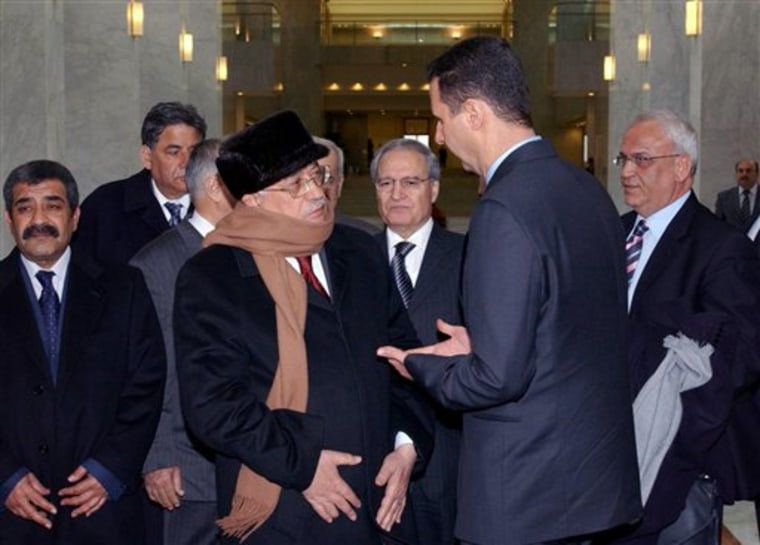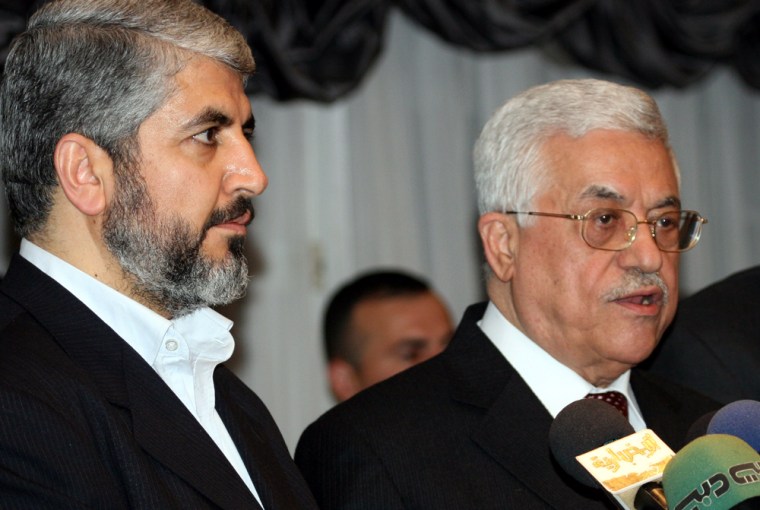Palestinian President Mahmoud Abbas and the exiled chief of the rival Hamas faction failed Sunday night to resolve their differences over forming a unity government, dashing hopes for a quick end to deadly clashes between their supporters.
But Abbas and Hamas leader Khaled Mashaal said in a statement that they “achieved major progress” during the meeting — their first since July 2005 — and hoped to resume talks within two weeks.
“There are still points of disagreement, but we will try to resolve them through a national dialogue until we form a national unity government,” Mashaal said during a joint news conference with Abbas in the Syrian capital, Damascus.
The two sides stressed that recent Palestinian fighting, which has killed at least 62 people, was unacceptable and pledged to exert efforts to avoid political friction.
“Palestinian bloodshed was considered totally prohibited, and we must exert all efforts to avoid frictions and internal clashes,” Abbas said.
Pre-emptive caution
The two men originally had been scheduled to meet Saturday evening, but that session was canceled and officials from both sides had cautioned against expectations the Sunday meeting might yield immediate results.
Both sides said differences remained, without providing details. The thorniest issues have been control of the two factions’ security forces and Hamas’ refusal to recognize Israel or commit to previous accords signed between Israel and the Palestinian Authority.
An official of Abbas’ Fatah party in the Gaza Strip was optimistic about the meeting, saying Abbas and Mashaal agreed to let an independent run the Interior Ministry, though they did not agree on who specifically should lead the powerful security wing.
“I think some things were accomplished. Some issues were resolved and others remain problematic. That would need continuation of dialogue here in Gaza and mediation in Damascus,” said Abdel Hakim Awad, Fatah’s spokesman in Gaza.
He said differences also remained over how the official document laying out the new government would be worded.
Sticking point: PM for new government
The deputy head of Hamas’ political bureau, Moussa Abu Marzouk, who attended some of Sunday’s talks, said the one sticking point were the conditions under which Abbas would name a new prime minister for the unity government.
Despite the lack of agreement, he said the meeting “will send a message to the Palestinian people that the two sides are committed to continue dialogue.”
Hamas, which controls the Palestinian parliament and Cabinet, and Abbas’ more moderate Fatah movement have been stuck in political deadlock since Hamas’ victory in legislative elections last year. Abbas, who is widely seen as a moderate, was elected president separately.
The refusal of the Islamic militants in Hamas to recognize Israel’s right to exist led to Western sanctions that have paralyzed the Palestinian economy.
Abbas has been pushing Hamas for months to form a unity government of independent experts in hopes of ending the sanctions and has threatened to call early elections if the two sides can’t agree.
Past agreements an issue
Abbas, Israel and the international community also want Hamas to abide by past agreements signed between Israel and the Palestinians. Hamas has said it would be willing to respect only previous agreements it deems as fair to Palestinians.
Syria hosts the exiled leadership of several Palestinian militant groups, including Mashaal, who has lived in Damascus since 1997, when he survived an Israeli assassination attempt in Jordan.
Sunday’s meeting came after intense mediation by Syrian Vice President Farouk al-Sharaa, who met separately with Mashaal and Abbas.
Abu Marzouk had earlier said the chance of a sit-down was “nonexistent,” but he told The Associated Press that “active and serious mediation” by the Syrians persuaded Abbas and Mashaal to talk.

Abu Marzouk had blamed the moderate Fatah president for the breakdown of talks and hinted Abbas was being pressured by Israel and the U.S. not to meet with Mashaal.
In the Hamas stronghold of Gaza — where tensions between the two factions frequently have exploded into open warfare — Palestinian Prime Minister Ismail Haniyeh of Hamas played down the significance of the Abbas-Mashaal meeting.
‘Some issues remain’
“It is not the meeting of last chances, and if it doesn’t yield 100 percent agreements, it doesn’t mean that we are heading to a new crisis,” he told a gathering Sunday. “The dialogue ... has gone a long way. ... Ninety percent of the issues have been agreed upon. Some issues remain.”
Hamas spokesman Fawzi Barhoum said a single meeting between the two sides had not been expected to solve all outstanding issues, but it overcame some obstacles.
“We consider the meeting itself a positive step. It was a good step to seriously build on to form a national unity government,” Barhoum said.
Abbas came to Damascus bolstered by Israel’s decision Friday to release $100 million in frozen Palestinian taxes that Israel has refused to turn over to the Hamas-controlled Palestinian government.
Israel said the money would be used by Abbas for humanitarian purposes and to strengthen his security forces.
